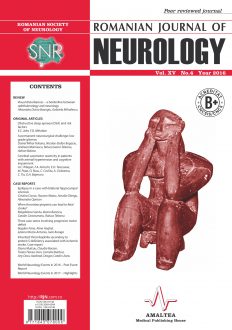SELECT ISSUE

Indexed

| |

|
|
|
| |
|
|
|

|
|
|
|
|
|
| |
|
|
HIGHLIGHTS
National Awards “Science and Research”
NEW! RJN has announced the annually National Award for "Science and Research" for the best scientific articles published throughout the year in the official journal.
Read the Recommendations for the Conduct, Reporting, Editing, and Publication of Scholarly work in Medical Journals.
The published medical research literature is a global public good. Medical journal editors have a social responsibility to promote global health by publishing, whenever possible, research that furthers health worldwide.
WHEN THROMBOCYTOPENIA CAN LEAD TO FETAL STROKE?
Magdalena Sandu, Ileana Barascu, Catalin Carstoveanu and Raluca Teleanu
ABSTRACT
Fetal stroke is a rare disease that occurs between 14 weeks of gestation and the onset of labor and can be caused by ischemic, thrombotic or hemorrhagic injury produced during pregnancy. One of the maternal conditions associated with fetal stroke is alloimmune thrombocytopenia. This needs to be differentiated from autoimmune thrombocytopenia, a condition in which mothers are previously affected. The neurological consequences of the fetal brain injury may be delayed neurological milestones, cognitive impairment, epilepsy and cortical blindness. Magnetic resonance represents the best diagnostic method to reveal prenatal brain injury.
Keywords: fetal stroke, alloimmune/autoimune thrombocytopenia, intracranial hemorrhage, neurological consequences
Full text | PDF
